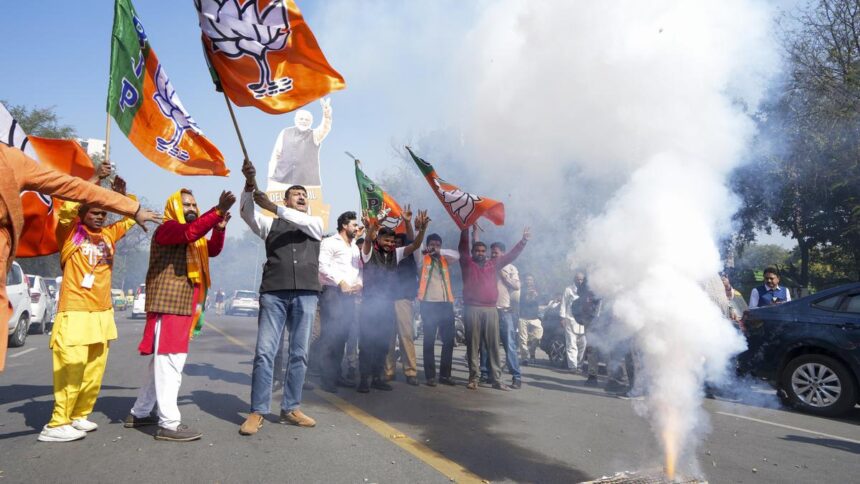The early counting trends for the Delhi assembly elections indicate a significant shift in power dynamics, with the Bharatiya Janata Party (BJP) currently leading in 48 seats. Meanwhile, the ruling Aam Aadmi Party (AAP) is projected to secure 22 seats. If these trends continue, the BJP could potentially reclaim power in Delhi for the first time in over 26 years.
The Congress party, however, seems to be struggling and may fail to win any seats unless there is a surprising last-minute change during the ongoing counting that began at 8 a.m. on Saturday.
As per the latest updates from the Election Commission of India, the BJP has surpassed the majority threshold necessary to form a government in the national capital, possibly bringing an end to the party’s prolonged absence from power in Delhi.
Top AAP leaders—including current Chief Minister Atishi, former Chief Minister Arvind Kejriwal, and ex-Deputy Chief Minister Manish Sisodia—are currently trailing behind their BJP counterparts. The only AAP politician showing a strong lead is Gopal Rai, the outgoing minister from Babarpur, who is ahead by over 22,500 votes against BJP’s Anil Kumar Vashisht.
Kejriwal is trailing by 1,170 votes against BJP’s Parvesh Sahib Singh, with Sandeep Dikshit, son of former Congress Chief Minister Sheila Dikshit, in third place as counting progresses through 9 of 13 rounds.
The trends suggest that this election is becoming a referendum on Kejriwal’s decade-long governance in Delhi. In the Kalkaji constituency, BJP’s Ramesh Bidhuri is leading by 2,882 votes against AAP’s Atishi, with Congress candidate Alka Lamba in a distant position.
Moreover, AAP minister Saurabh Bharadwaj is lagging behind BJP’s Shikha Roy in Greater Kailash by 1,003 votes. Meanwhile, Congress’s Garvit Singhvi is positioned third with 3,903 votes, which is more than the gap between the leading BJP and AAP candidates, indicating that Congress may act as a “vote splitter” in these elections.
In areas with significant Muslim populations, where minority votes constitute approximately 55% or more, AAP appears to be maintaining its influence, leading in 7 to 8 seats, including Chandi Chowk and Okhla. Conversely, the BJP is ahead in Kerawal Nagar and Mustafabad.
In the 12 assembly segments reserved for Scheduled Castes, AAP is reportedly securing the majority, suggesting that the poorer and marginalized communities continue to support Kejriwal, largely due to social welfare initiatives such as free electricity and water services. However, urban areas seem to favor the BJP, with analysts speculating that the middle class has shifted its allegiance away from AAP, partly due to tax rebates introduced in the recent General Budget for salaried individuals.
Early celebrations have already commenced at the BJP’s offices in Delhi and at the national level, with Prime Minister Narendra Modi expected to arrive at the party’s national headquarters later in the evening.
In response to the emerging trends, Delhi BJP President Virendra Sachdeva asserted that this election has been a contest between effective governance and mismanagement. He cited issues like contaminated water, poor road conditions, inadequate sanitation, and pollution in the Yamuna River as indicators of Kejriwal’s governance that have led voters to reject his leadership.
Sachdeva emphasized that the public has opted for Prime Minister Modi’s model of governance, which is widely respected across the nation. He further claimed that prominent AAP leaders, including Kejriwal and Atishi, are set to lose their elections because they have failed to live up to public expectations.
On the day of polling, February 5, the voter turnout was recorded at 60.54%.










